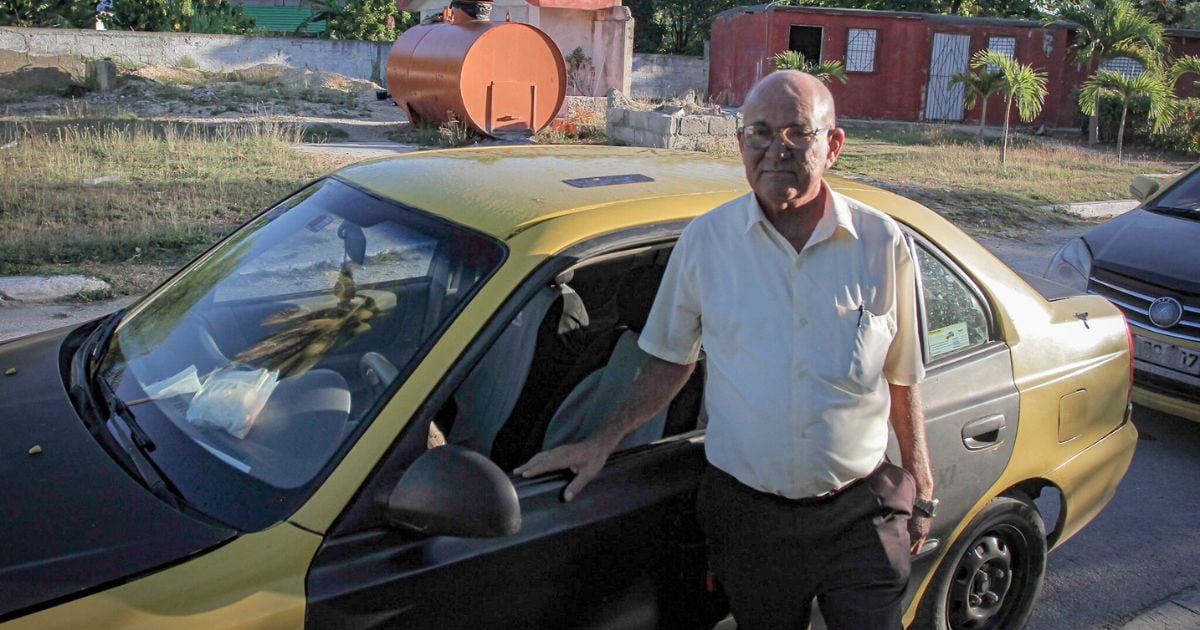Ricardo Palmero Rodríguez isn't your average taxi driver. At 68 years old, he's dedicated nearly four decades of his life to serving those in dire need: the hemodialysis patients of Sancti Spíritus. His remarkable story was recently highlighted by Transportation Minister Eduardo Rodríguez Dávila on social media, yet it stands on its own without any need for official embellishments.
Amidst Cuba's chronic transportation crisis and the dire conditions in its hospitals, Palmero offers a glimmer of hope to the patients he transports daily. Since 1986, he's become a guardian angel on wheels for countless individuals who must regularly visit the Nephrology and Hemodialysis Service at Camilo Cienfuegos Hospital.
Although Palmero began his career in transportation in 1978, it was his shift towards assisting the ill that defined his path. "I always strive to be punctual because they have a set schedule to keep," he says, aware that his role extends beyond merely driving patients—it's about being a constant presence in their ongoing battles.
Over time, the service became more organized, assigning fixed vehicles to patients, fostering a more personal connection. Palmero doesn't see them as clients but as people. "They're not just passengers; they're human beings who are suffering," he emphasizes. This empathy has sustained him through the toughest times, including the loss of those he has grown close to. "The hardest part is when a patient passes away. You bond with them, they become family," he admits.
One particularly tough moment occurred on January 1st of this year, when he arrived to pick up a patient only to learn they had died overnight. "It was a very difficult moment," he recalls with sorrow. Despite the pain, Palmero remains committed to his mission, recognizing that his service is a beacon of hope in the bleak reality of living in Cuba. "Amidst so much illness and death, my desire to help keeps me going," he states.
Even as he contemplates retirement, Palmero's commitment to his calling remains unwavering. "After retiring, I'll stay in the transportation sector, which is what I've always done," he promises. He also has a message for society: "When a hemodialysis patient arrives at a pharmacy or anywhere, they should be given priority. We need more empathy and understanding for those facing such challenges."
In a nation where resources—and often compassion—are scarce, individuals like Ricardo Palmero remind us that true service requires neither uniforms nor accolades, just a genuine heart.
Since 2023, the Cuban regime has warned of an increase in kidney issues in Sancti Spíritus, a testament to the worsening state of the nation's nephrology healthcare system. The lack of medical supplies and limited access to specialized treatments have further complicated the situation for patients with chronic conditions, such as those reliant on hemodialysis.
Meanwhile, a Cuban woman's complaint about inadequate dialysis care highlighted further deficiencies within the hospital system. Recently, the regime announced a new transportation service for children with illnesses, a positive step that nevertheless underscores the continued reliance of adult patients—particularly those with renal conditions—on alternative solutions and individual acts of kindness for hospital transport.
This March, a new community-driven initiative supported by Habana Club introduced tricycles to aid in transporting vulnerable individuals. This effort underscores that, in the face of governmental shortcomings, civic responses continue to arise to meet the critical needs of those most in need.
Understanding the Challenges of Hemodialysis Patients in Cuba
Why is Ricardo Palmero's service important for hemodialysis patients?
Ricardo Palmero provides essential transportation for hemodialysis patients who need to regularly attend treatment sessions at the hospital. His service offers reliability and emotional support, crucial in a context where public transportation is unreliable, and healthcare conditions are challenging.
What are the main issues faced by kidney patients in Cuba?
Kidney patients in Cuba face a lack of medical resources and limited access to specialized treatments. The deteriorating healthcare system exacerbates these issues, making it difficult for patients to receive consistent and adequate care.
How has the community responded to the transportation crisis for sick individuals?
In response to the transportation crisis, community-driven initiatives like those supported by Habana Club have emerged. These initiatives use alternative methods, such as tricycles, to assist in transporting vulnerable individuals, showcasing the community's resilience and solidarity.
